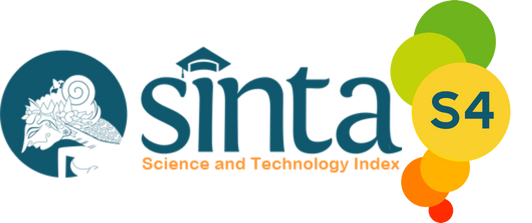Development of a Guided Inquiry-Based Experimental Design for the Synthesis of GO-PANI from Coconut Shell Charcoal
DOI:
https://doi.org/10.52434/jkpi.v5i2.42652Abstrak
This study aims to develop an experimental design based on guided inquiry for the synthesis of GO–PANI composites derived from coconut shell charcoal, packaged in a Student Worksheet. The development follows the Research and Development (R&D) model, consisting of three main stages: preliminary study, research, and instructional material development. Preliminary studies analyze the needs through syllabus and journals. The study was in the form of a preliminary test in the laboratory in the synthesis of graphic oxide (GO) with a modified Hummers method, then composed with polyanilin through in situ polymerization. Development of teaching devices in the form of experimental and student worksheet designs. The student worksheet was structured according to guided inquiry phases: orientation to the problem, problem formulation, planning and conducting experiments, data analysis, and drawing conclusions. Validation by three experts indicated that the experimental design and student worksheet were rated highly valid, with an average r value of 0.94. A feasibility test involving ten students showed very positive responses, with an average feasibility score of 92.2%. The success of the experimental design is reflected in its ability to integrate locally sourced biomass-based material synthesis with a contextual and applicable guided inquiry approach. In addition, characterization of the synthesized products using FTIR and SEM confirmed the successful formation of the GO–PANI composite. This research contributes to the development of instructional tools relevant to modern chemistry education while supporting the principles of renewable energy and the sustainable utilization of local resources.
Keywords: Coconut shell charcoal, Experimental design, GO-PANI, Guided inquiry, Student worksheet.
Unduhan
Diterbitkan
Terbitan
Bagian
Lisensi

Ciptaan disebarluaskan di bawah Lisensi Creative Commons Atribusi-BerbagiSerupa 4.0 Internasional. Penulis yang menerbitkan dengan jurnal ini setuju dengan ketentuan berikut:
- Penulis mempertahankan hak cipta dan memberikan hak penerbitan pertama kepada jurnal dengan karya yang secara bersamaan dilisensikan di bawah Lisensi Attribution-ShareAlike 4.0 International (CC BY-SA 4.0) yang memungkinkan orang lain untuk membagikan karya tersebut dengan pengakuan kepenulisan karya dan publikasi awal dalam jurnal ini.
- Penulis dapat membuat pengaturan kontrak tambahan yang terpisah untuk distribusi non-eksklusif dari versi jurnal yang diterbitkan dari karya tersebut (misalnya, mengunggahnya ke repositori institusional atau menerbitkannya dalam buku), dengan pengakuan publikasi awal dalam jurnal ini.
- Penulis diizinkan dan didorong untuk memposting karya mereka secara online (misalnya, di repositori institusional atau di situs web mereka) sebelum dan selama proses pengiriman, karena hal ini dapat mengarah pada pertukaran yang produktif, serta sitasi yang lebih awal dan lebih besar dari karya yang diterbitkan (Lihat Efek Akses Terbuka).













